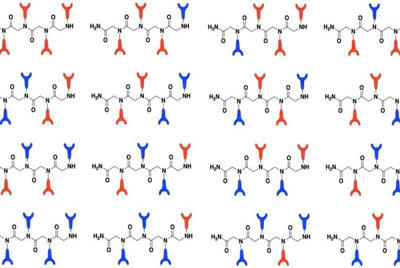
A team of scientists led by Berkeley Lab has developed a library of artificial proteins or "peptoids" that effectively "chelate" or bind to lanthanides and actinides, heavy metals that make up the so-called f-block elements at the bottom of the periodic table.
The new library offers researchers an automated, high-throughput method for precisely designing new peptoids—protein-like polymers with a precise sequence of monomer units—that chelate lanthanides such as gadolinium, a common ingredient in MRI contrast agents, and actinides such as plutonium.
As reported in the journal Chemical Science, the researchers incorporated custom-made monomers with f-block-binding properties onto peptoid scaffolds at Berkeley Lab's Molecular Foundry. In this initial study, the researchers assembled two bio-inspired hydroxypyridinone and catecholamide monomers onto molecular complexes called "tetramers," yielding a library of 16 chelating peptoids (also known as "ligands"). The researchers then used a luminescence-based technique to measure how well each chelating peptoid coordinated to the lanthanide cations (positively charged ions) europium and terbium.
The researchers discovered that the chelating systems featuring three and four hydroxypyridinone functional groups show a high affinity for lanthanide metals, and in particular europium, suggesting that these peptoid-based chelators could be used to design ligands tailor-made for a wide range of applications with f-block metals, such as chemical separation processes, optical device optimization, and pharmaceutical development. In addition, extending the researchers' technique to incorporate additional monomers could potentially lead to much larger libraries.
The study was led by Rebecca Abergel, a faculty scientist in Berkeley Lab's Chemical Sciences Division and assistant professor in UC Berkeley's Nuclear Engineering Department.

